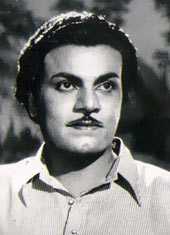P. S. Veerappa
| P. S. Veerappa | |
|---|---|
 | |
| Born |
P.S.Veerappa September 10, 1911 Kangeyam, Madras Presidency |
| Died |
September 11, 1998 (aged 87) Chennai, India |
| Occupation | Actor, Producer |
| Years active | 1939-1998 |
| Religion | Hindu |
| Spouse(s) | V. Veera Lakshmi |
| Awards | Kalaimamani Award, Rajiv Gandhi Award |
P.S. Veerappa (Tamil: பி எஸ் வீரப்பா) was a famous villain actor of yester years and a producer of Tamil Cinema.
Early life
Veteran artiste, P. S. Veerappa’s ‘audacious’ laughter ha ..ha ..haa .. was very popular with the cine-goers of yester years. Born in 1911, Veerappa belonged to Kangeyam. But he grew up in his grandfather’s house in Pollachi right from an early age. He was interested in studies but there were no income sources due to large members in family. He tried many small trading business which never gave him good returns. Before coming to madras he used to act in plays which was conducted in temple festival in Sivanmalai where he saw K. B. Sundarambal and her brother. They insisted him to join cinema and told him to come to Madras. So he came to Madras with the aim of joining cinema and met K. B. Sundarambal; he expressed his fervent desire to her and Sundarambal sent him to Ellis R. Dungan with a recommendation letter.[1]
Career
Duncan was directing the film Manimekalai at that time in which Sundarambal had an important role. And, Veerappa was introduced to cinema through that film in 1939. His next films were Udayanan Vasavadatta, in which G. N. Balasubramaniam and Vasundhara Devi were the lead pair and Jupiter Pictures’ Sri Murugan with C. Honnappa Bhagavathar as the hero. MGR was also in the cast and Veerappa and MGR became friends after this film. Their friendship was intact till end and the duo acted in many films together as hero and villain. Veerappa’s popular laughter "ha ..ha ..haa .." was first tried in the film Chakravarthi Thirumagal in which MGR was the hero. As it had tremendous response, it was continued by Veerappa in all his subsequent films and it became his trademark. In the film Vanjikottai Valiban, there is a dance sequence in which Vyjayanthimala and Padmini are both dancing, challenging each other in the song Kannum Kannum Kalanthu. In this scene, Veerappa shouts, “Sabhaash … sariyana potti …”, welcoming the challenge. This particular shot evokes claps from the audience even today whenever the film is screened. And, in his another film Mahadhevi, Veerappa, the villain, would chase the heroine K. Savithri with so much lust. In the scene in which he realizes that he could never get Savithri, he would say, “Manadhaal Mahadevi, illaiyel maranadevi …”. This dialogue gets consistent claps from the audience even today and remains popular with the cine-goers of yesteryears. He was associated with six Chief Ministers (C. N. Annadurai, M. Karunanidhi, M. G. Ramachandran, N. T. Rama Rao, V. N. Janaki & J. Jayalalitha) as an actor and producer.[1]
Sivaji Ganesan was a great admirer and fan of Veerappa’s acting and his ‘famous’ laughter. Sivaji had openly expressed this admiration on many occasions. Veerappa had acted as the villain with four generation heroes, starting from MGR and Sivaji to heroes like Kamal Haasan, Rajinikanth and Vijayakanth. A molded villain in movies, Veerappa was a great human being in real life. He became a producer also and produced many films. Veerappa, who had no leaning for any political party, died in September 1998. He had a daughter and a son.His son P. S. V. Hariharan is a film producer today, and he has a daughter and a son.[1]
Selective Filmography
As Actor
- Raj Mahal (1963)
- Sivagangai Seemai (1959) aka "The Land of Sivagangai" - India (English title)
- Nadodi Mannan (1958) .... Rajguru aka "The Vagabond King" - International (English title)
- Chakravarthi Thirumagal (1957) .... General Bhairavan
- Mahadevi (1957)
- Alibabavum Narpadhu Thirudargalum (1956) .... Abu Hussain
- Sorgavasal (1954) .... King Vetrivelan aka "Gateway to Heaven" - India (English title)
As producer
- Aalayamani (1962)
- Anandha Jodhi (1966)
- Aadmi (1968)
Aandavan Kattalai (1964)